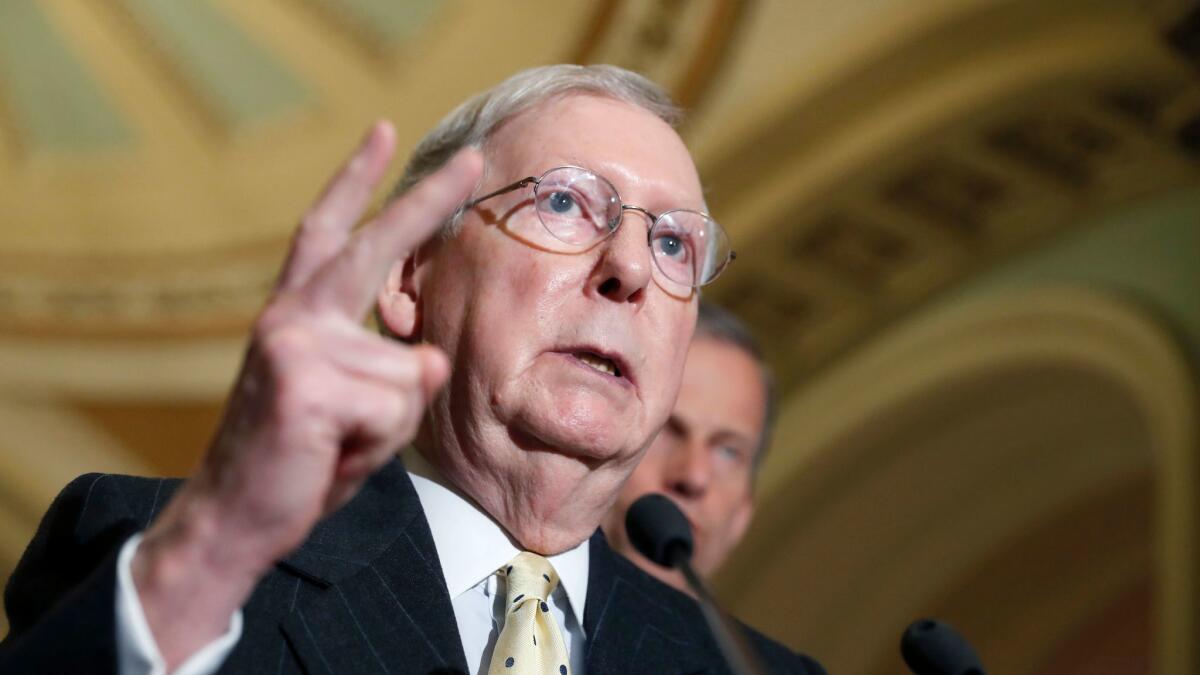Republican secrecy faces mounting criticism as GOP senators work behind closed doors to replace Obamacare
Reporting from Washington — Senate Republicans are facing increasing criticism for ducking public scrutiny as they craft legislation to roll back the Affordable Care Act with little input from outside experts, patients, physicians and others most affected by healthcare legislation.
The GOP’s secretive process marks a sharp departure from the traditional way the Senate has developed large, complex bills, which are often debated for years with multiple committee hearings to ensure broad input and careful analysis.
The closed-door approach, which is even more opaque than the process used earlier this year in the House, is all the more remarkable given the bill’s likely impact on tens of millions of Americans, many of whom could see their health insurance protections substantially scaled back or eliminated altogether.
“It is deeply disturbing,” said Erika Sward, assistant vice president of the American Lung Assn. “Patients groups like ours need to make sure that our patients’ needs for healthcare will be met. … We can’t do that if we can’t see what is being proposed.”
The lung association is among 120 patient groups that this week sent a letter to senior Republican senators expressing deep concerns about GOP proposals to fundamentally restructure Medicaid, which provides health coverage to more than 70 million poor Americans.
Although Senate Majority Leader Mitch McConnell (R-Ky.) has indicated he wants to vote on a bill in the next two weeks, Senate Republicans thus far haven’t disclosed details of their Medicaid plans, or any other part of their healthcare legislation.
The Obamacare repeal bill passed by the House in May, which has helped guide the Senate discussions, would slash federal healthcare assistance to low- and moderate-income Americans by nearly $1 trillion and increase the number of uninsured by 23 million over the next decade, according to the nonpartisan Congressional Budget Office.
Speaking to reporters at the Capitol this week, McConnell — who had previously vowed a much more open legislative process for the healthcare bill — denied there was any effort to conceal the Senate legislation.
“We’ll let you see the bill when we finally release it,” he said. “Nobody’s hiding the ball here. You’re free to ask anybody anything.”
But even some GOP senators have voiced increasing frustration about the lack of public debate about the specifics of how Republicans plan to replace Obamacare, as the healthcare law is frequently called.
Sen. Lisa Murkowski (R-Alaska) lamented in an interview with online news site Vox this week that she couldn’t even answer basic questions about the bill.
“None of us have actually seen language,” she said. “My constituents expect me to know, and if we had utilized the process that goes through a committee, I would be able to answer … my constituents’ questions.”
It remains unclear if any GOP lawmakers will try to hold up the healthcare legislation, however, as no Republican senator has yet demanded publicly that McConnell slow down or hold hearings on the legislation.
Before voting, the Senate, unlike the House, will have to wait for an independent analysis from the CBO.
The lack of public debate appears to be a deliberate strategy by McConnell and his lieutenants to minimize opportunities for critical evaluation of their bill, which is likely to be highly controversial.
Senate Finance Committee Chairman Orrin Hatch (R-Utah) said holding public hearings about the legislation would only give Democrats more opportunity to attack the bill.
“We have zero cooperation from the Democrats,” he said. “So getting it in public gives them a chance to get up and scream.”
But interest in the GOP healthcare legislation extends far beyond Democratic politicians on Capitol Hill.

Major physician groups, hospitals, consumer advocates and organizations representing millions of patients with cancer, diabetes, heart disease and other serious illnesses have been pleading with Republican leaders for months to open up the process and listen to their concerns.
This week, a group of more than 15 patients groups — including the American Heart Assn., the March of Dimes, the American Lung Assn. and the American Diabetes Assn. — asked McConnell’s office to meet with them next week, proposing any time between Friday and June 22.
A representative from McConnell’s office told them staff schedules were too busy, according to representatives of several of the organizations.
McConnell spokesman Don Stewart said the majority leader’s schedule is full. “Numerous meetings are already booked well in advance,” he said.
Dick Woodruff, vice president of the American Cancer Society’s advocacy arm, said even when he and others have sat down with Republican congressional aides, it is often fruitless.
“The Senate staff generally don’t know anything,” Woodruff said. “There are so few people who understand what is going on that having meetings isn’t particularly productive. … This is such a closed process.”
Another representative of a leading patient group compared the experience to “talking to a wall.”
The concerns about the healthcare legislation extend to the broader public as well, polls suggest.
The House bill is extremely unpopular, with voters disapproving of the legislation by nearly 4 to 1.
Just 17% of registered voters backed the House bill in a recent nationwide poll, compared with 62% who disapprove of the legislation. This week, Trump reportedly called that legislation, which he celebrated six weeks ago in a Rose Garden ceremony, “mean.”
Rutgers University professor Ross Baker, who has spent decades studying Congress, said lawmakers have traditionally used committee hearings and public debate over legislation to help educate voters and build support for complex and controversial legislation such as the civil rights bills of the 1960s.
That is what makes the current GOP effort so remarkable, he said. “I can’t think of another piece of legislation of this scope and magnitude that affects so many people that has been drawn up behind such a dense veil of secrecy.”
Don Ritchie, historian emeritus of the Senate, said not since the years before World War I has the Senate taken such a partisan, closed-door approach to major legislation.
A century ago, Senate Democrats, at the urging of President Woodrow Wilson, drew up major tariff reforms while shutting out Republicans. But when Democratic leaders tried that again when they had large majorities during the Great Depression, rank-and-file senators revolted. It hasn’t happened since, he said.
Even the deeply partisan debate over the development of the Affordable Care Act, which ended with Democrats alone voting for the bill, had Republicans at the table for much of the process.
That included 53 hearings and meetings about healthcare in the Senate finance committee, according to a tally assembled by the committee.
The committee — a group of Democratic and Republican senators who spent months in 2009 trying unsuccessfully to develop a bipartisan compromise — then spent seven days marking up final legislation, the longest mark-up of a bill in more than two decades.
In the end, the Senate devoted nearly 15 months developing the Affordable Care Act before it was finally enacted in March 2010.
ALSO
Trump tells senators the House healthcare bill is ‘mean’
Sen. Kamala Harris on Republicans who voted to repeal Obamacare: ‘You need to lose your job’
UPDATES:
1:25 p.m.: This article was updated with a comment from a spokesman for Senate Majority Leader Mitch McConnell (R-Ky.).
This article was originally published at 10:20 a.m.
More to Read
Get the L.A. Times Politics newsletter
Deeply reported insights into legislation, politics and policy from Sacramento, Washington and beyond. In your inbox three times per week.
You may occasionally receive promotional content from the Los Angeles Times.












